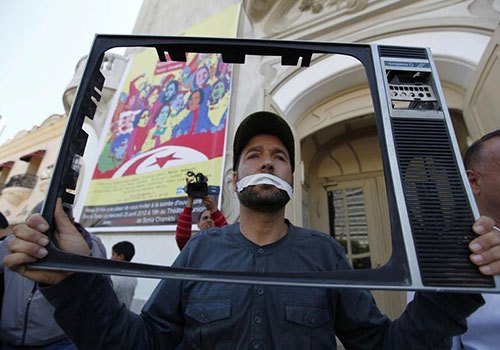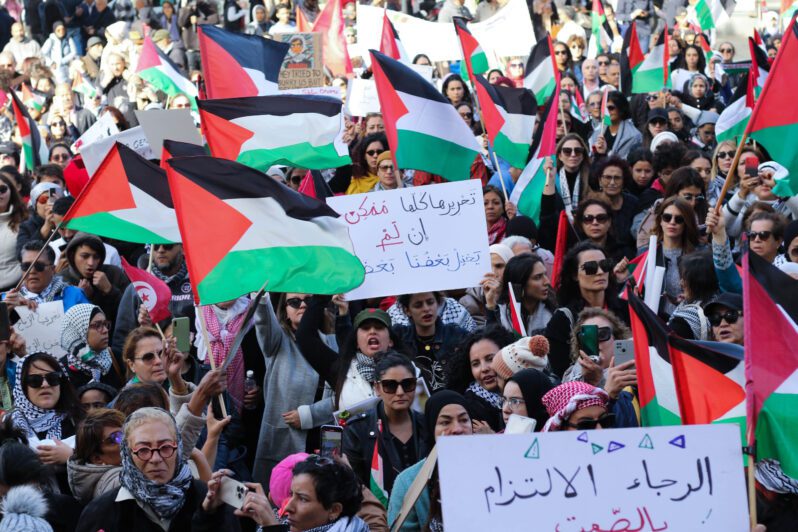The Silence of the Palace: Measures to Control Information in Tunisia

Since Tunisian President Kais Saied announced a range of exceptional measures on 25 July 2021, many interpretations, opinions, false facts, and “leaks” have emerged at the expense of correct information. Most local television stations lagged behind the events, and when they sought to catch up, they produced media content marred by flimsy information and interpretation and based largely on propaganda.
The Press Council criticized this media treatment in its latest statement. It mentioned that media establishments merely relayed information, disregarding the importance of investigation, analysis, and interpretation. It noted that some media had engaged in “political and ideological polarization by limiting themselves to one narrative of the events, commenting on them from one perspective, and providing an opportunity for a number of commentators to propagandize for political actors”. It also mentioned the “publication of news without verifying its authenticity and an occasional lack of balance in reporting the various stances”.
Although the announcement of the exceptional measures called for much clarification, particularly given the controversy and fears they provoked, the President’s Office maintained its old communication policy and opted to continue addressing the public and the media through its Facebook page. The National Syndicate of Tunisian Journalists (SNJT) previously described this policy as “the silence of the palaces” in its annual report. The report noted that under Saied, the Presidential Palace has been “closed to the media and journalists. The presidency has not held press conferences or press briefings since his election. Its interaction with journalists, media, and the public sphere has been limited to the publication of videos of presidential activity and the president’s statements on the President’s Office’s Facebook page. It has not allowed journalists and media to enter the palace, meet and speak with officials, and obtain information from the source or allowed officials from the President’s Office to appear in media programs or even make statements and answer questions preoccupying the public”.[1]
The President’s Office Comments Rather Than Informs
After July 25, the President’s Office’s page became the sole platform controlling the production of media content, publication of communiques, and promotion of presidential activities. In the absence of press briefings and conferences, Saied’s impromptu comments became the only resource for attempting to understand the directions of governance in Tunisia and potential future steps. Usually, the president does not present clear information about planned measures; rather, he merely makes general comments while conducting field visits or hosting local and foreign figures.
This choice of communication has fostered ambiguity, especially as the president’s comments – which have become the only liaison with Carthage Palace – are not so much a source of information as they are propagandistic political messages. In this context, Khawla Chabbeh, a representative of the Unit for Monitoring and Documenting Violations Against Journalists in the SNJT’s Center for Occupational Safety, told the Legal Agenda that, “There is a problem with the President’s Office as it has no clear communication strategy. Contentedness with issuing communiques and video clips without making direct statements has contributed to a lack of extra information. Consequently, journalists have turned to experts to compensate for the ambiguity of decisions and statements, which has caused opinion to dominate over accurate news. The President’s Office must therefore revise its communication plan to avoid ambiguity and rumors”.
Since the exceptional measures were announced, a reluctance to deliver statements to the media has prevailed among officials, and the President’s Office appointed no spokesperson to clarify the measures. Hence, in a joint communique, the Independent High Authority for Audiovisual Communication and press organizations demanded “a mechanism for communication between the professional organizations representing the media sector and the President’s Office”. Subsequently, former attaché to the Diplomacy Department of the President’s Office Walid El Hajjam, who was nominated an advisor to the president on August 5, undertook the role of unofficial spokesperson via appearances the majority and most important of which were on foreign channels.[2] In the same context, the July 2021 report by the aforementioned monitoring unit noted that information had been withheld from some journalists, such as Tunis Afrique Presse’s Ayida al-Hishri. An attaché of the President’s Office refused to provide her with information clarifying its connection to the barring of guests of the program After July 25 from the premises of Tunisian public television, arguing that he does not repeat statements that he already delivered to another media outlet.[3]
The Social Media Gamble
Saied’s communication policy seems to accord with his conception of the media’s relationship with the public. Since arriving in Carthage Palace, he has tried to entrench a communication practice driven by the logic that the political leader can address the people directly via field visits or a Facebook page and there is no need for institutionalized media such as television and radio stations, newspapers, and magazines. This strategy allows the president to say whatever he wishes to the public without going through a media intermediary that accommodates debate and thereby reduces, one way or another, the potency of the pre-prepared, unilateral political discourse. Saied also sought to turn his communication into an enigmatic and exciting spectacle by using historical images and rare and unusual Arabic expressions that subsequently became popular on social media and in common parlance.
Since July 25, many pages supporting Saied have been active on Facebook, brimming with posts glorifying his image and hostile to his opponents. This dynamic generated by social media appears to largely align with the President’s Office’s communication policy as it creates an invisible audience that is easily swayed, mostly driven by emotion, and very susceptible to believe inaccurate and misleading news. Betting on social media, even though it reproduces an individualistic culture of suppressing and rejecting debate and different ideas, comes at the expense of laying the groundwork for a democratic and free media that respects the principle of citizenship and produces spheres of public debate that accord with the values of justice and equality.
The Media and the Future of Democracy
The local media coverage of the events of July 25, especially on the television stations, indicated a lack of independent editorial lines governing media outlets’ relationship to politics. While foreign stations were focusing their lenses on Tunisia, local channels were broadcasting entertainment evenings, Turkish series, and old documentaries. Moreover, after recovering from the shock of the event, some tried to catch up with the new political era by propagandizing for the presidential measures, while others preserved their old party ties. In general, the television stations in particular were not prepared to produce informative content providing interpretive and analytical insights that take into account the values of freedom and plurality.
In the field, on July 25 many journalists suffered various violations,[4] whether by police forces, Saied supporters, or Ennahda supporters. In some editorial rooms, a wait-and-see approach, self-censorship, and a search for ways to adapt to the new situation prevailed. Some private television channels even displayed the slogan “the people rise up and the president responds” in the backdrop of their political programs. This media treatment indicates that a significant part of the media sector – particularly television – will face the new situation while towing the legacy of the past decade, when the media became very entangled with money and authority. Hence, the media is predisposed to get on board with the new authoritarian outlook and offer propaganda services to the President’s Office until the direction that circumstances are heading becomes clear. In this context, Etidal al-Majbari, president of the Press Council’s bureau, told the Legal Agenda that, “The media must be a national project, and the time has come to evaluate the past ten years and come out with major moves to reform the media, with all actors”. She added, “The Press Council, as a safeguard to strengthen the quality and freedom of journalism and guarantee the public’s right to access information as well as to complain, so far lacks the resources to perform its functions”.[4] She also mentioned that there is no communication with the President’s Office. Established in mid-September 2020, the Press Council includes representatives of the SNJT, the Tunisian Federation of Newspaper Directors, and the General Federation for Media in the Tunisian General Union for Labor.
This article is an edited translation from Arabic.
Keywords: Tunisia, President’s Office, Exceptional measures, Press Council, SNJT
[1] SNJT, “al-Taqrir al-Sanawiyy li-Waqi’ al-Huriyyat al-Sahafiyya fi Tunis”, 3 May 2021.
[2] On 9 September 2021, El Hajjam appeared in an interview on Sky News, wherein he revealed the President’s Office’s intentions regarding the 2014 Constitution and the existing political system and spoke about the imminent appointment of a prime minister and the reasons for its delay.
[3] Unit for Monitoring and Documenting Violations Against Journalists, July 2021 report.
[4] Ibid.



